Winter RV Living: 7 Tough Lessons We Learned
There’s plenty to be said for being spontaneous while you are full-time RVing. But winter RV living is definitely going to turn out best with some planning and preparation.
As we have aged, it seems that we have also grown more spontaneous. We make decisions quickly and act even quicker. While we have experienced some fantastic situations and allowed some amazing things to take place in our lives, spontaneity can also lead to some stressful situations.
That is especially true during the colder winter months. Looking back, we realize much of the stress could have been avoided with a little planning and preparation.
The good news is that you can benefit from the lessons we learned the hard way as we experienced winter RV living.
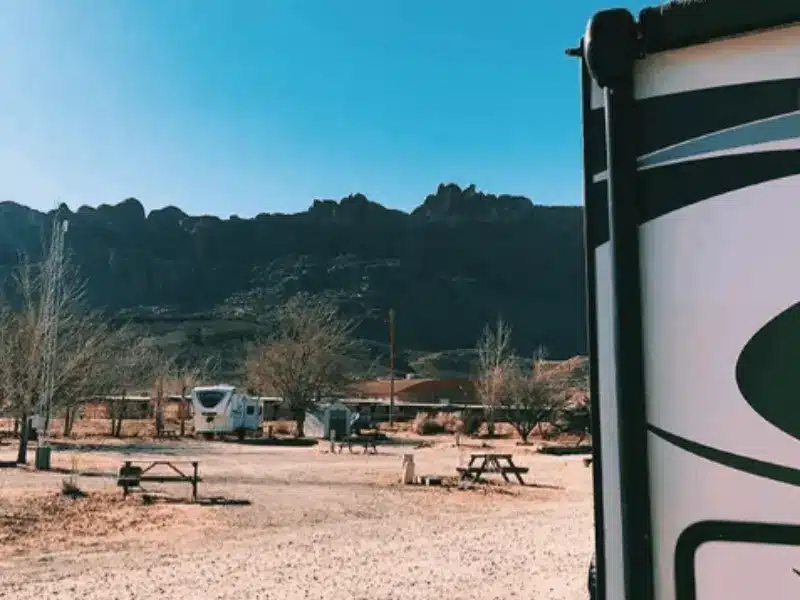
TREKKN is ready-supported. We may earn a small commission for qualifying purchases, at no additional cost to you. Please read our disclosure for more information.
Lessons We Learned About RV Living in Winter
Let me start out by saying that I don’t have any true regrets about our full-time RV travels. Actually, in hindsight I wish we had been better equipped for more boondocking experiences.
All in all, our travels went about as smoothly as we could hope. Our family created memories that will last us several lifetimes. Having said that, it’s easy to look back and recall core lessons we learned. Unfortunately, many of those lessons were learned the hard way.
Some of our tough experiences could have been avoided had we given more time and attention to our travel plans. No doubt about it.
You don’t have to do things the hard way. Learn from our mistakes and lessons. This guide provides a detailed overview of the most important things to know before traveling in an RV during winter.
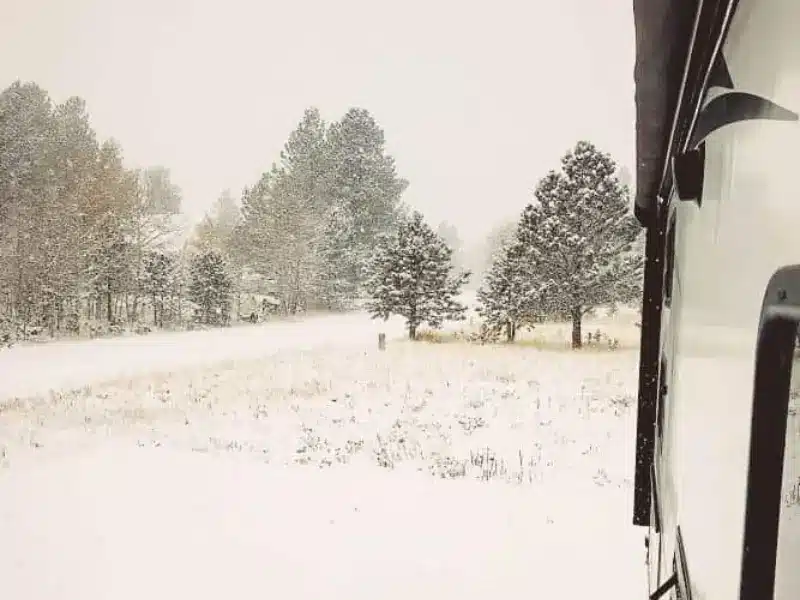
Take a minute to check out this overview of a 13,235 mile road trip across North America for 12 months of 70-degree weather.
A Heated Water Hose Is Like Gold
When we rolled out of the moderate climate of Sedona, Arizona in early December and headed north toward Utah, we didn’t know what we were getting ourselves into.
Our stop in Williams, Arizona (west of Flagstaff) for a few days definitely got a bit chillier. The temps were perfect for exploring around the Grand Canyon and we fully enjoyed it.
But then things got real. Real chilly, that is.
Be Prepared if You Travel to Utah During Winter
We rolled into Utah during the second week of December and put down roots in Kanarraville (just south of Cedar City). The plan was to explore the nearby parks, but the extreme temps followed our Travel Trailer straight to the Kanarraville.
We didn’t even know what hit us.
We woke up that first morning with no water coming out of our faucets, introducing us for the first time to true cold weather RVing.
After two or three nights of disconnecting and draining the RV water hose at night and reconnecting in the morning, I decided it was time to look at alternatives.
The Cheapest Option is Not Always the Best Option
When I drove into Cedar City to track down a heating option for our water hose, I wasn’t even sure what to look for. I hadn’t even explored on Amazon because I wanted an immediate solution.
After unsuccessful searches at local stores, I found a farm and tool supply store that carried a a few options I thought might work.
One was a heating plate normally placed under pet beds, which cost about $35. The other was an actual heated water hose priced at over $100.
You can guess which one I chose. Did I mention that I sometimes learn things the hard way?
It only took one night and another frozen hose to understand that the heating plate option was not going to cut it in the low-teen temps.
Back to the store I went to exchange that first purchase for what should have been my first purchase: a heated RV water hose.
- Heating cable protects against freezes to -40° F
- Includes adapter allowing connection at either end of hose
- Approximately 8 pounds
That product worked great…but it wasn’t the end of our fight with frozen hoses that winter. We had quite the unpleasant experience in Moab when I made a big mistake with our heated water hose.
If you would prefer a DIY option for your heated hose, which I ended up choosing in the end and was very happy with, you can check out this YouTube tutorial.
Propane Tanks Run Out in the Middle of the Night
I guess it’s human nature to push things as far as they can go. And that includes the limits of your propane tanks.
When I look back on it, it was kind of like playing a game of “chicken” with those tanks…betting that the morning would arrive before they could empty themselves.
And more than once, I paid the price for playing that ill-advised game. Well, I should say WE paid the price, because we all had some very chilly mornings due to my lack of planning. (Sorry family!)
Our Two 20-Lb Tanks Were Not Enough
On our travel trailer, we had two 20-lb (5 gallon) tanks. It seemed like plenty to get us through just about anything. Well, that was true for the summer and fall months.
But it didn’t take long for me to get a feel for just how much faster those tanks can run dry when the temps drop near zero. Or below zero as we experienced at our next long-term stop in Larkspur, Colorado.
Yup, just as the extreme temps (record-setting, if I remember correctly) dropped in on us during our stay in Utah, it didn’t take long for them to find us in Colorado as well in mid-December. (Yeah, duh.)
Christmas with Family is Important
We made the trek north so that we could spend the holidays with my brother and his extended family in the Denver area. The challenges we faced were all related to weather, not family.
We had lived in the area for three years before our move to Texas, so we were very familiar with the climate.
There was no doubt it could get bitterly cold, but we also knew it could be remarkably mild as well in the winter months. We needed a little bit of luck on our side to keep things in that mild category.
But luck had left the building.
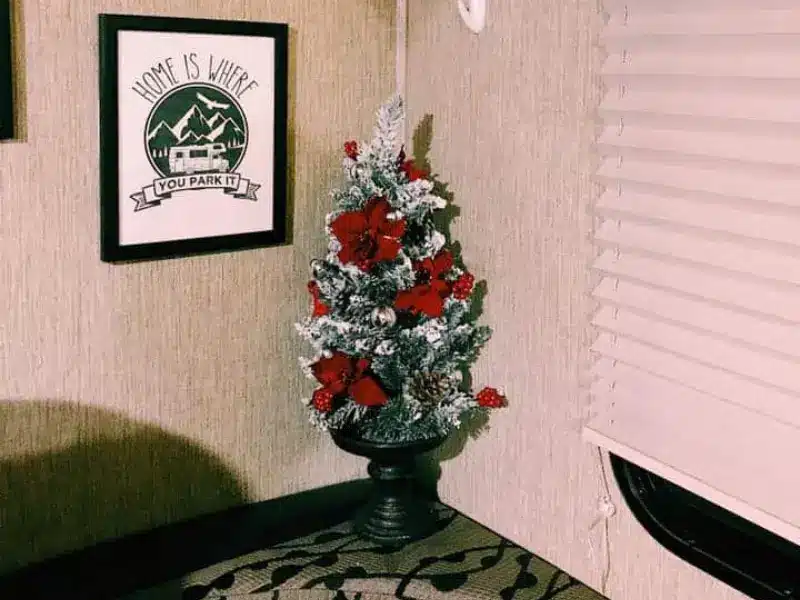
Instead, we quickly found ourselves plunged into the numbing reality of sub-zero wind chills. Yes, I believe Colorado also set some record lows during our two-week stay there. (Yay for records.)
An Extra Propane Tank is Worth the Expense
The bottom line is that my estimates for our propane usage couldn’t keep up with the reality of the conditions. We were emptying both tanks every other day or so, and I was very thankful our RV park had an on-site propane station. Otherwise, we would have been in a world of hurt!
So please, if you are heading into some extreme conditions, spend an extra few bucks and get an extra propane tank to keep with your rig so that you don’t have any miserable and stressful mornings like we did.
Protect Your Propane Tanks from the Elements
Consider buying a storage cover for the tank.
Outland Living makes a multi-purpose tank cover. It protects propane tanks from the elements, has ventilation grommets, and a durable top that can be used a small side table.
Prevent your tank from freezing with a quality weather resistant propane tank cover.
Weather proof and water-resistant cover helps prevent propane tank from freezes. We think it also looks nice.
Stay Comfortable with an RV Electric Heater
Without a doubt, when it comes to staying warm and comfy in your RV during the winter, a full propane tank is your BFF. If you don’t have it, you’ll quickly be a popsicle.
But having a backup/supplemental heat source also makes a lot of sense. During our travels, we had a small RV electric heater to add an extra layer of comfort. And it came in very handy on more than one occasion, that’s for sure.
Choose the Right Size Heater for Your Space
If you have a larger RV, I would definitely recommend having at least two RV electric heaters this size, or a larger one with more output. A tabletop heater worked well for us, but it’s designed for a small space. If you have a Class A, you’ll want to get more than one.
Your toes will thank you if you follow this advice from the road.
Plan for Time to Pass Slower When it’s Cold Outside
I love my family. I really do. We’ve been through plenty of stuff together and have come out the other side still tight.
But when you are “locked” in a small RV with any group of people without much hope of escape, let’s just say that things can get edgy. And occasionally ugly.
It’s like the human version of the Instant Pot, but the product is not nearly as enjoyable. 🙂
Stay Active to Stay Sane
The reality is that you need to make some plans to get yourself and your family out of the RV for a decent amount of time each day or tensions will mount and things will blow.
With an actual Instant Pot, the built-up pressure produces some very tasty meals that are perfect for a cold wheather RVing experience.
But, when the RV itself becomes a pressurized pot, nothing good can come of it. Do yourself a favor and make a list of activities, sightseeing options, and even chores to do outside of the RV to keep everyone sane and satisfied during your RV travels.
Purchasing the Instant Pot could have been a stand-alone lesson as well. It was our favorite kitchen appliance for making delicious meals on the road. I highly recommend it for RV living.
Even a 4 Season RV Has Limits
Did you think I was done with sharing our winter RV living saga? Never fear…I have more!
Colorado just kept coming at us with its need to prove how wintry and bitterly cold it could actually be. Clearly, we had severely underestimated its ability to do winter, despite having lived there!
So here’s how it went down: For five days around Christmas, we actually decided to get an Airbnb in Denver so that we could have a more reasonable drive to visit family during that period (it was close to an hour from our RV park to their place).
We had made those plans before the extreme temps hit, but we actually extended our stay a bit longer to try and allow for the coldest conditions to pass.
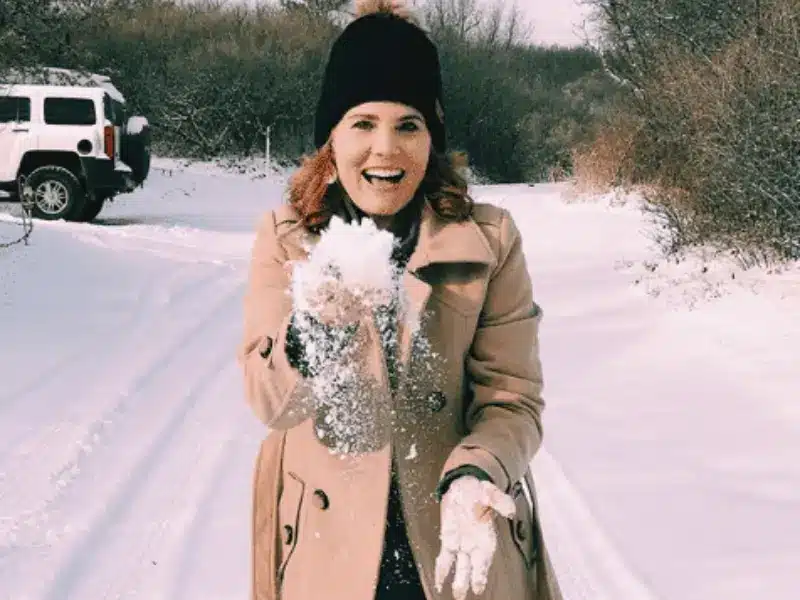
I Did Some Things Right…
While we were away from the RV, I thought I was taking the necessary steps by keeping the thermostat set at 55 degrees to keep everything from freezing and also making sure the heated water hose was disconnected and stored inside and the water pump was turned off.
I neglected to consider the location of the water pump in the travel trailer: in an enclosed space just inside the wall of the trailer, where it was more exposed to the cold temps and also cut off from the interior heat.
(I did make a trip back down to the RV during our time away so that I could refill the propane and make sure all was well. Such a genius.)
But I Didn’t Do All the Things Right
What I should have done (gotta love hindsight) is opened up the water pump enclosure so that heat could circulate into that space.
Also, I should have attempted to close up gaps around the adjacent electrical cord to cut down on cold air intrusion. And no doubt should also have placed a small warming source (heat cable or a shop light) in that space with the water pump.
But none of that happened.
When we finally returned to the RV, we walked inside to find…that everything was perfect. No disasters, no messes, no issues. Yay! Time to warm it up and turn the water back on.
And that’s when it happened: a puddle of water started emerging from under our master bed.
Cleaning Up the Chaos
Instant chaos and pandemonium ensued. There was yelling. People got upset. It wasn’t our finest moment.
As you can guess, that water pump had frozen and cracked. Even the city water passes through the water pump, so the water just spilled forth when it was turned back on.
Since we got the water mopped up immediately, there was no damage to the travel trailer at all from the incident.
Luckily, I only had to drive about an hour away and spend $80 or so to get a replacement water pump and install it myself.
This could have ended so much worse, but I hope that you are able to learn a lesson or three from our errors in this scenario and avoid the stress and expense.
A Heat Cable Has Many Uses
As I mentioned above, the RV park personnel in Larkspur, Colorado were very helpful and gave us some valuable tips about cold weather RVing. If they hadn’t taken the time to enlighten us a bit when we arrived, our stay could have been far less enjoyable and far more expensive.
He did tell us about keeping our gray tank closed and only draining when necessary, and also about keeping the RV hose flat to avoid dips that would cause ice dams in the hose and damage it.
Protect the Refrigerator
By far the most valuable tip he gave us was this: Purchase a heat cable and wrap it around the refrigerator condenser. That’s located in an exterior panel of the travel trailer and the heat cable will help keep it from freezing (and blowing out).
As you might know, the refrigerator is probably the single most expensive item in your RV (at least for travel trailers). Please make sure you protect it at all costs.
If I hadn’t gotten that tip and our condenser had been damaged, we could have potentially been out $2,000+ for a new refrigerator. Yeah, ouch!
So thank you again, RV park guy, for sharing your wisdom and spreading the RV love with the community. I now pass it along in your honor.
Don’t Forget About the DIY Heated RV Water Hose
And do you remember that DIY heated water hose I mentioned earlier? Yup, that also requires the use of this same type of heat cable.
So in all, there are at least three very practical uses for that type of heat cable during winter RV living:
- Wrapping and protecting your refrigerator condenser (if located on the exterior)
- Creating a DIY RV water hose for FAR cheaper than purchasing one
- Placing around your RV water pump to protect from extreme temps (especially while away from the RV)
Yes, the heat cable is the winter RVer’s new best friend.
Winter RV Living Requires Advanced Planning
Yes, this one obviously goes without saying again. But sometimes the best wisdom, even if it seems obvious, bears repeating:
Planning ahead for your winter RV living is an absolute must that will save you heartache, headache and dollars in the long run!
You know that I’m speaking from experience here, as I have clearly laid out in front of you. Please learn from my mistakes.
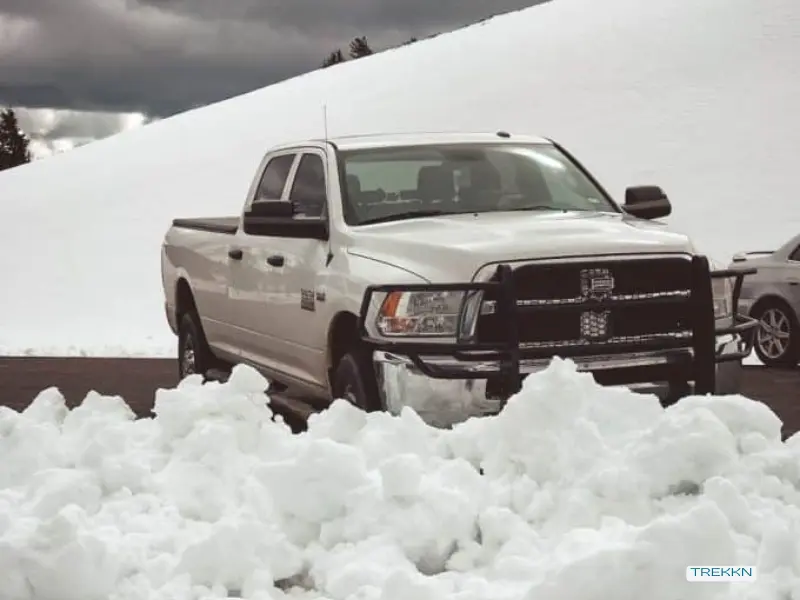
Coming out of that experience, here are my best recommendations (a recap of everything I have mentioned) if you are heading into similar territory.
Plan and Prepare for Winter RV Living
Here is a checklist of my recommended must-do items to prepare for RV Living during winter.
Share Your Winter RV Living Tips
I freely admit we don’t know everything there is to know about RV travel during winter. Many of you have a lot more RVing experience than us. We would love to hear from you about the lessons and tips you have learned along the way.
What preparations do you take to keep yourself safe and warm during winter RV living?
Drop your suggestions in the comments below. We can’t wait to hear from you!
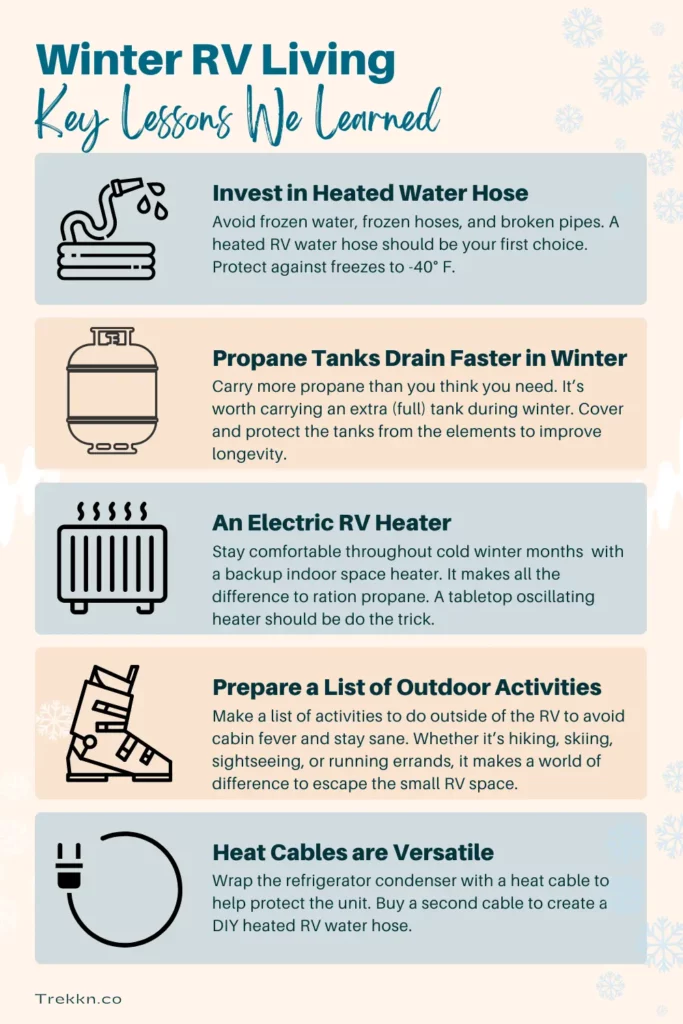
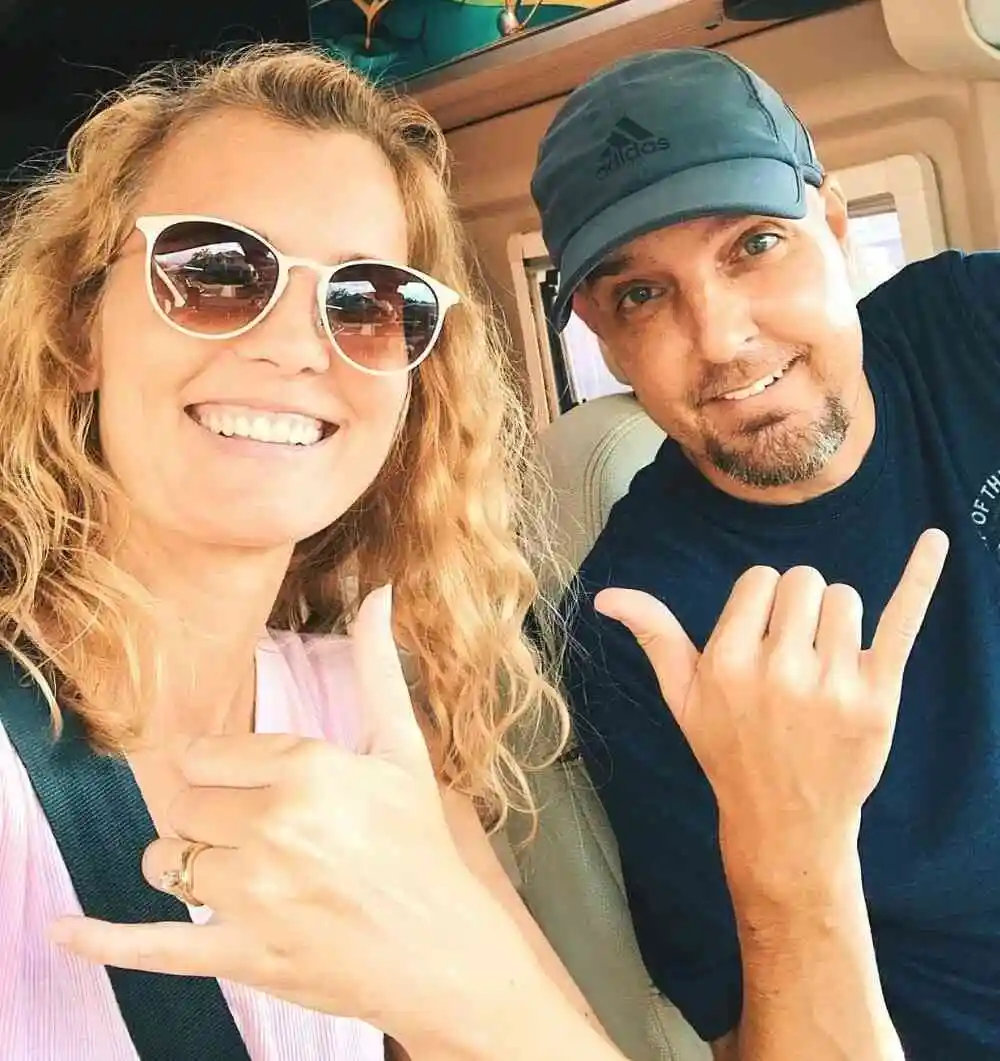
Todd loves a competitive game of table tennis, a breathtaking hike, and exploring new places. He lived and traveled in an RV with his family as they traveled throughout much of the US and parts of Canada. Todd has extensive knowledge about RV travel, safety, and accessories and has shared many of his stories here on TREKKN. When he’s not busy launching and building small businesses, you may find him staring at pictures of Glacier National Park (probably his favorite spot on earth).


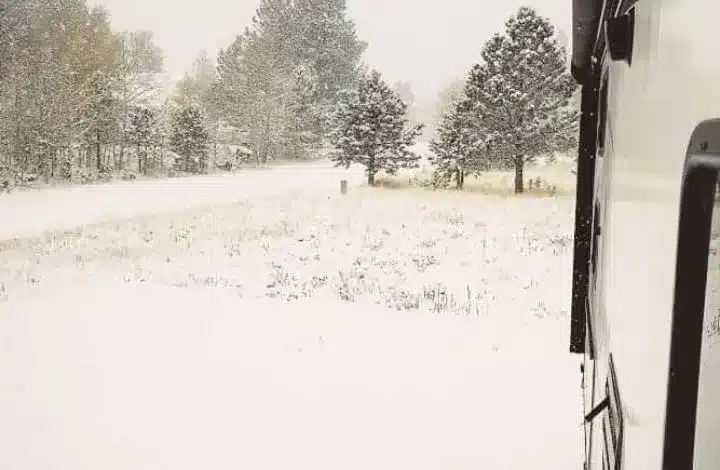




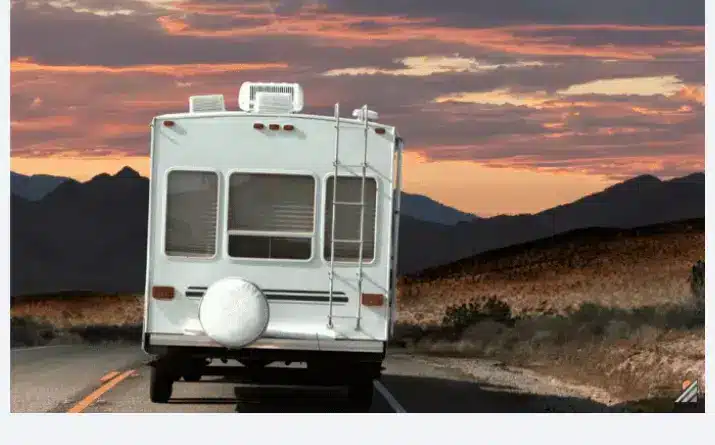
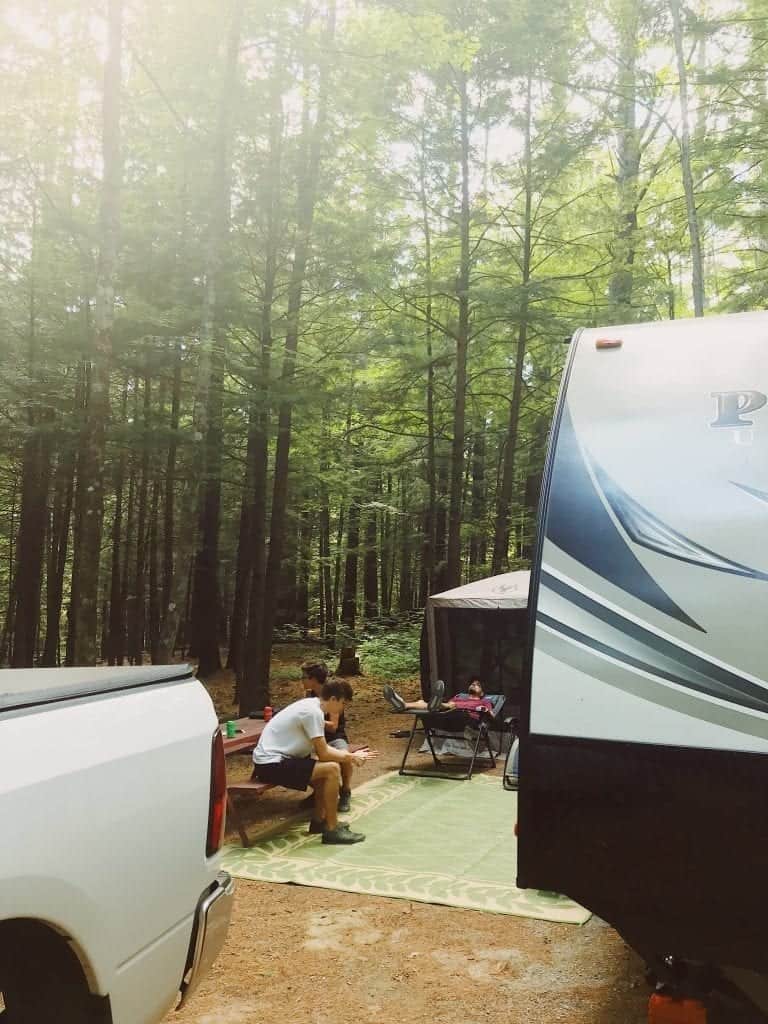
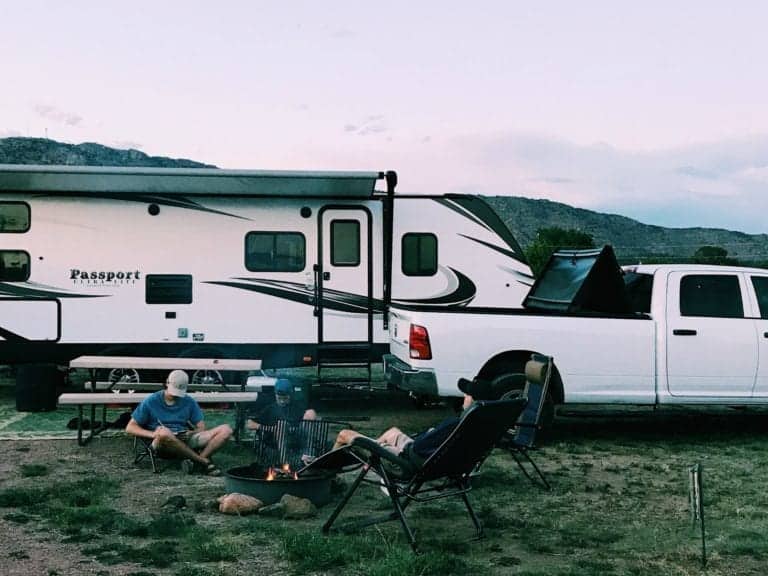
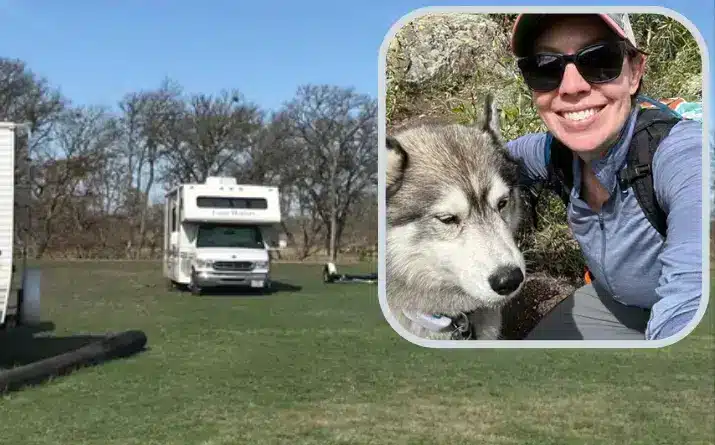
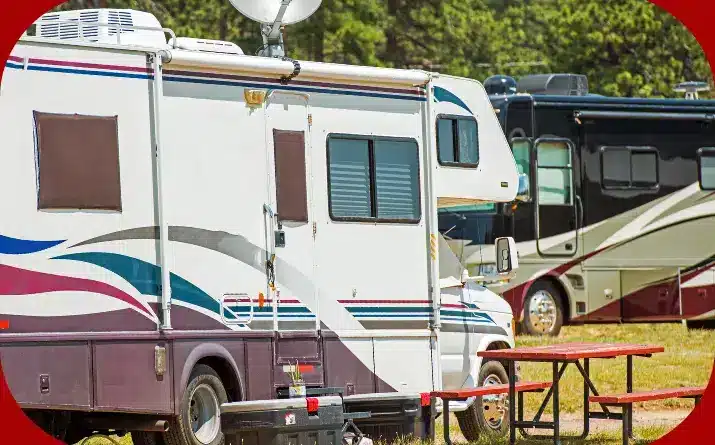
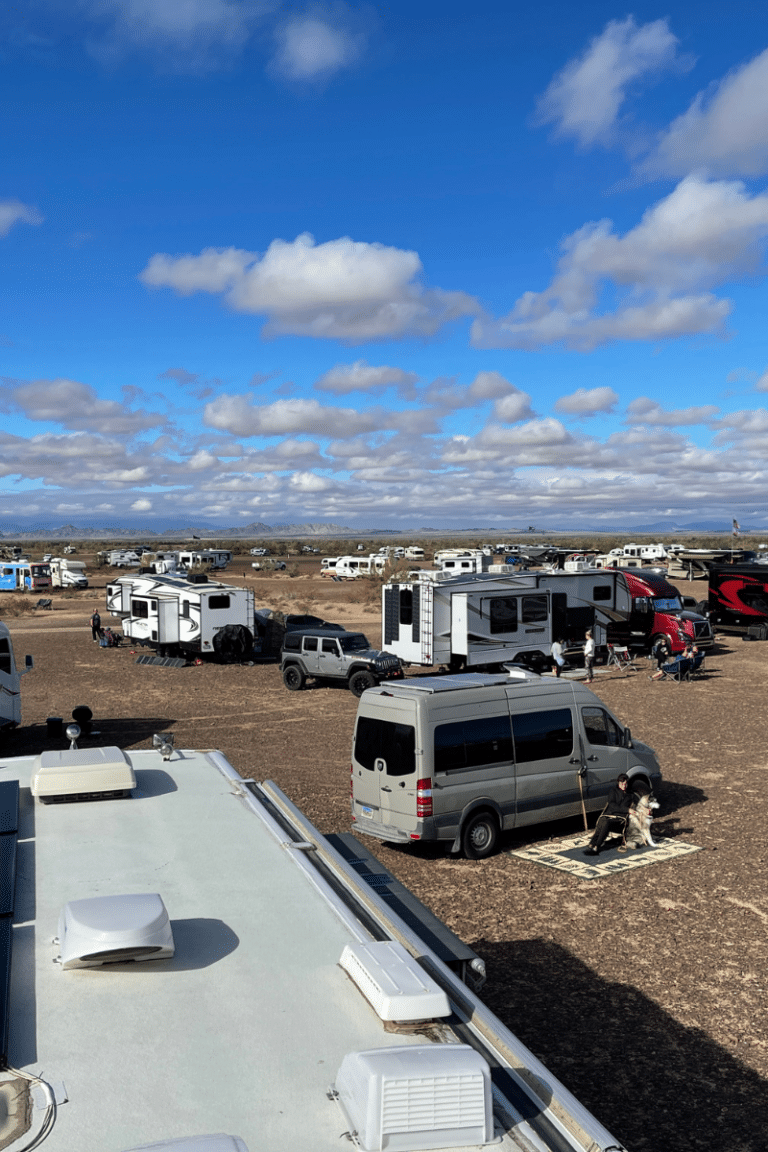
I so appreciate your information and wisdom. Question: You talk about a heat cable for the refrig. When I click on the link the page can’t be found. Could you share actually what you purchased for this purpose?
Hi Dawn, so glad to hear that the site is helping you out! And thank you for pointing out that bad link in the post. I’ve just updated the post with a correct link, but here is the link to that heat cable you asked about:
https://amzn.to/3kxoAah
This is a 6-foot cable, but if you search around a bit on Amazon or in your local hardware store (Lowe’s, Home Depot), you may be able to find a 3-foot cable. That would be a better match for refrigerator condenser. (I think the recent cold weather snap across much of the country has depleted supplies of the 3-foot option.)
If you have any other questions, or spot any other issues, please let us know! And happy RV travels…
Do you have any pictures of how you installed the heat cable around your refrigerator compressor?
We live in our RV full-time while we build a house. (we haven’t even started building yet, lol) This will be our 2nd winter. We moved from South Florida to Kentucky 2years ago. We have learned alot so hopefully it will make this winter easier! We bought pool noodle’s on clearance to insulate our water hose before even leaving FL. Got them for $1.00 a piece! They are holding up nicely! We use 2 sm/med space heaters. Oh and,heat tape and heat cable. We use a Conversation oven so as to keep our propane for heat and hot water.we utilize the cold weather and cooler’s to keep things cold/frozen to store extra food because sales on food are to good to pass up! Especially meat! We have to numerous to put in comments. We can be reached by email though.
Great tips, Kitty! Anything to stay warm and toasty. 🙂
Best wishes with the new home!
Well we headed to Montana for Christmas with family. Roads were ok but never looked at forecast. The next night,in central Montana the temperature 35 BELOW ZERO. Motorhome aren’t built for temps like that but we survived. Plugged into electric at son’s home but couldn’t get inside RV temps above 55. Got sheets,thin blankets and clothes pins and covered all windows. That did the trick. Got a heat lamp like baby chickens have and propped it near water pump.
Back then the water lines ran thru ducts for heat. Lesson learned..check the forecast and get a roll of quilted foil. Great for windows hot or cold if you encounter extremes. After that experience we went into snow n cold pulling trailer with snowmobiles. We didn’t use water, carried jugs, and had quilted windows. Generator kept us comfy.
Live and learn. If you didn’t make a mistake then you missed a learning experience.
Rose and Helly Kanoldt
Currently have 2019 Fleetwood Southwind.
Sorry for the very late response, Rose, but thank you for sharing your experience. Glad you learned some valuable lessons and found some handy fixes!
All I know is that I will think VERY long and hard before I head into any type of winter RVing situation again. The stress and headache of it all can quickly drown out the fun of the adventure itself if you’re not careful.
We wish you the happiest of travels in 2022! Peace.
Thanks for sharing. I’m not sure about the refrigerator compressor thing. Should any and all fridge compressors be protected from freezing even when in storage and turned off? Or is it just because you kept your running with food in it? Thanks
That is a good question, Tim. I would have to research that to find out for sure, but my guess would be only when in use.
All I can tell you is that I’m glad we got that tip from the campground worker and protected ours during that icy blast. What an adventure!
Thanks for sharing your experience. It will be very helpful to me. BTW, did you keep comfortable in your RV during the cold wintery nights? Was the little heater sufficient? Or did your RV have a furnace?
Hi Jim,
Since ours was a “4 season” travel trailer with enclosed underbelly, we didn’t have too many problems staying warm. We went through the propane pretty quickly in our RV furnace during a very cold Colorado Christmas, but the heater and a few blankets kept us pretty cozy overall.
Having said that, I wouldn’t go do that again knowing what I know now. It was stressful and a bit challenging overall…and when we left the travel trailer for a few days to stay in an Airbnb, the propane ran out and the water pump froze and burst. It wasn’t our finest hour and ended up being a bit too extreme for us.
Hope that helps! Let me know if you have any other questions.
Great read.
is leaving the propane heat on set on 50 degrees, when we are away during the winter?
We have a 2022 Flagstaff Microlite. Heating pads for tanks as well as an enclosed underbelly.
what is the best way to leave the camper during the winter months, without draining the entire water system?
thanks
Hi Gary,
I honestly can’t advise you one way or another on leaving the propane heater running while you are away. I have personally left it on while away for a few days at a time, but never for an extended period of time. If the temps are in the teens or lower, even setting it at 50 is going to drain your propane every few days or so.
As far as the water system, if you are taking the step to add heating pads to the tanks, that tells me it gets cold enough where you are that it would be quite a risk not to winterize your water system. It sounds like asking for trouble, and if it were me I would probably go through the hassle of fully winterizing.
Here is a post about winterizing your rig: https://trekkn.co/rv-winterization-tips/
That’s my .02, but I wish you the best whatever decisions you make!
Thank you, dearly, for your excellent winter suggestions for an RV. You helped me become far more educated on living in an RV in the winter time, and I tremendously appreciate it. Thank you and God bless you and family. Kindly, Loretta Halstead
Thank you so much for the wonderful message! Safe travels.
Just did some winter camping. We had trouble with moisture in camper. When we woke in am so much water on windows, walls etc. any ideas to stop this or slow it down?
The best tip we know is to use a dehumidifier. It sounds like you’re dealing with condensation vs a leak, but I recommend checking all your seals (don’t forget the roof) when you have a chance (and as part of regular maintenance). Tip – save the water captured from the dehumidifier to rinse dishes or clean RV. You could get a tub of DampRid or Camco moisture absorber to help absorb excess moisture. Stay warm and safe travels!
Thanks for the info! Lady and I are planning on using our camper more next season and possibly long periods of time. It is a 4 season with enclosed bottom. Retired and want to travel! 2 30lb. Tanks. Thanks!!
Excellent! Best wishes for your upcoming epic adventures!
Thanks so much Kitty! We live in Florida but have a Keystone Bullet on a lot (full hook’up) near the Mississippi River in Illinois. We stay there for 3 months each spring & fall. (Sometimes it snows before we leave.) We use a lot of Propane during the fall and have tried a ceramic space heater. It pulls so much power that it flips the breaker. Any advice?